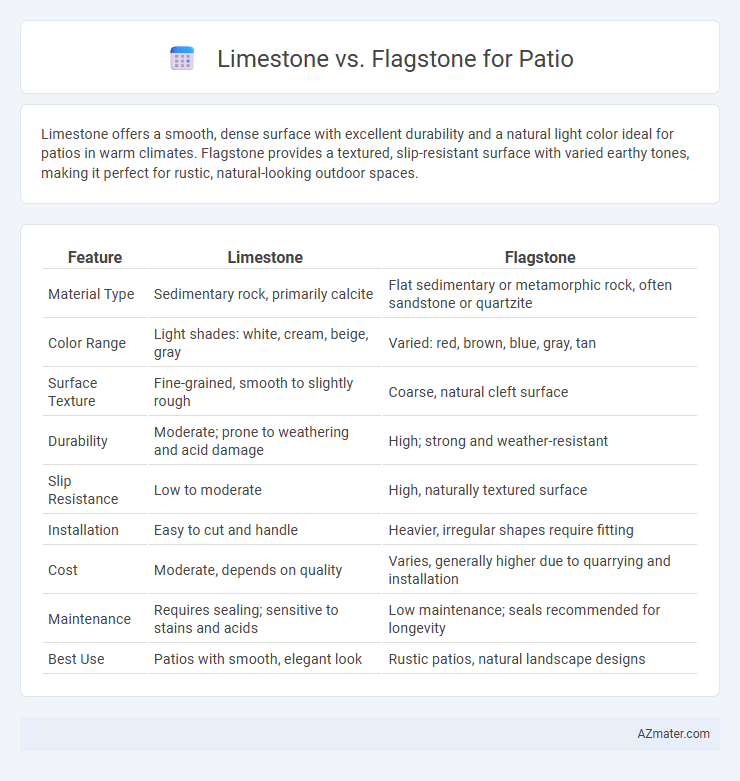Limestone offers a smooth, dense surface with excellent durability and a natural light color ideal for patios in warm climates. Flagstone provides a textured, slip-resistant surface with varied earthy tones, making it perfect for rustic, natural-looking outdoor spaces.
Table of Comparison
| Feature | Limestone | Flagstone |
|---|---|---|
| Material Type | Sedimentary rock, primarily calcite | Flat sedimentary or metamorphic rock, often sandstone or quartzite |
| Color Range | Light shades: white, cream, beige, gray | Varied: red, brown, blue, gray, tan |
| Surface Texture | Fine-grained, smooth to slightly rough | Coarse, natural cleft surface |
| Durability | Moderate; prone to weathering and acid damage | High; strong and weather-resistant |
| Slip Resistance | Low to moderate | High, naturally textured surface |
| Installation | Easy to cut and handle | Heavier, irregular shapes require fitting |
| Cost | Moderate, depends on quality | Varies, generally higher due to quarrying and installation |
| Maintenance | Requires sealing; sensitive to stains and acids | Low maintenance; seals recommended for longevity |
| Best Use | Patios with smooth, elegant look | Rustic patios, natural landscape designs |
Introduction to Patio Stone Choices
Limestone and flagstone are popular patio stone choices known for their durability and natural beauty. Limestone offers a smooth texture and light, consistent color ideal for elegant, modern patios, while flagstone features irregular shapes and earthy tones perfect for rustic, natural designs. Selecting between limestone and flagstone depends on desired aesthetic, maintenance levels, and environmental conditions of the patio space.
Overview of Limestone and Flagstone
Limestone is a sedimentary rock composed primarily of calcium carbonate, known for its soft texture, light color variations, and excellent durability in outdoor environments. Flagstone is a type of sandstone or slate characterized by its flat, thin layers ideal for creating natural-looking patios with irregular shapes and a textured surface. Both materials offer unique aesthetic and functional qualities, with limestone providing a more uniform appearance and flagstone delivering a rustic, varied look.
Aesthetic Differences: Limestone vs Flagstone
Limestone offers a smooth, uniform surface with subtle color variations in shades of cream, beige, and gray, creating a refined and elegant patio aesthetic. Flagstone exhibits a more rugged, natural appearance with irregular shapes and diverse earthy tones ranging from reds and browns to blues and grays, adding rustic charm and texture. The choice between limestone and flagstone significantly impacts the patio's visual appeal, with limestone favoring sleek sophistication and flagstone enhancing natural, organic aesthetics.
Durability and Longevity Comparison
Limestone offers moderate durability with a softer composition, making it more susceptible to scratches and weathering over time, especially in freeze-thaw climates. Flagstone, typically composed of sandstone or quartzite, boasts superior hardness and resilience, ensuring greater longevity and resistance to chipping and erosion in outdoor patio applications. Selecting flagstone for patios guarantees enhanced long-term performance and reduced maintenance compared to limestone surfaces.
Surface Texture and Comfort Underfoot
Limestone offers a smooth and consistent surface texture, providing a sleek appearance and comfortable feel underfoot, making it ideal for patios where barefoot walking is common. Flagstone features a naturally textured, uneven surface with a rustic look, which can enhance traction but may be less comfortable for prolonged barefoot use. Choosing between limestone and flagstone affects both the aesthetic and tactile experience, balancing smoothness with natural grip for outdoor patio spaces.
Weather Resistance and Climate Suitability
Limestone offers moderate weather resistance with a tendency to absorb moisture, making it best suited for dry or mild climates where freeze-thaw cycles are minimal. Flagstone, often composed of durable sandstone or quartzite, provides superior resilience against extreme weather conditions, including heavy rain and freezing temperatures, ideal for regions with variable climates. Choosing between limestone and flagstone depends heavily on local weather patterns, ensuring longevity and maintaining aesthetic appeal for patio surfaces.
Installation Process and Ease
Limestone offers a smoother surface and is typically easier to cut and install for patio projects, making it ideal for DIY enthusiasts and quick installations. Flagstone's irregular shapes and uneven thickness require more precise fitting and sometimes additional base preparation, resulting in a more labor-intensive installation process. Choosing limestone reduces installation time and complexity, while flagstone provides a more natural, rustic appearance but demands higher skill and effort during installation.
Maintenance Requirements for Each Stone
Limestone patios require regular sealing to protect against staining and weathering, along with routine cleaning using mild detergents to prevent surface erosion. Flagstone demands less frequent sealing due to its higher density and natural resistance to wear but may need occasional removal of moss or algae in shaded areas. Both stones benefit from prompt spill cleanup and periodic inspection to maintain their durability and appearance over time.
Cost Comparison: Limestone vs Flagstone
Limestone patios typically cost between $10 and $30 per square foot, offering an affordable option for homeowners seeking durability and natural beauty. Flagstone, characterized by its irregular shapes and diverse colors, ranges from $15 to $45 per square foot, often commanding higher prices due to its aesthetic appeal and installation complexity. Factoring in labor and maintenance, limestone generally provides a lower-cost patio solution compared to the more premium-priced flagstone.
Choosing the Best Stone for Your Patio Needs
Limestone offers a smooth, uniform texture with a softer, more porous surface ideal for cool, shaded patios, while flagstone provides a durable, naturally textured appearance perfect for high-traffic, sun-exposed areas. Consider climate, foot traffic, and maintenance requirements when selecting between limestone's elegant finish and flagstone's rugged strength. Opt for limestone if you prefer a refined, easy-to-cut stone, or choose flagstone for its slip-resistant, weather-resistant qualities that enhance outdoor durability.

Infographic: Limestone vs Flagstone for Patio
 azmater.com
azmater.com